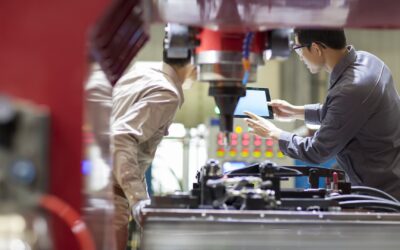It’s no secret that the manufacturing industry is undergoing a massive transformation at the moment. To stay competitive, manufacturing companies are under pressure to implement smart manufacturing solutions that digitize and automate processes and workflows.
Whenever there is seismic change within an industry, it’s inevitable that there will be disruption, confusion, and, in some cases, anxiety surrounding it. The two immediate challenges facing manufacturing companies are:
How to realistically plan and implement Industry 4.0 technology.
How to get employee buy-in and reduce fears that it will replace them.
Identifying common misconceptions about Industry 4.0 and addressing them will help managers and shop floor workers to gain a clearer picture of smart manufacturing, formulate realistic expectations of what it can achieve, and reduce fears that it will replace workers and managers.
Misconception 1: Industry 4.0 will Cause Job Losses
Let’s address the biggest myth first, which is one that creates a lot of anxiety for manufacturing employees. Smart manufacturing technology will not put everybody out of work. It’s true that Industry 4.0 technology will lead to the automation of many manual tasks and jobs, but it won’t replace people altogether.
History has shown that automation may make some jobs redundant, but often creates new jobs and opportunities in its wake. For instance, when Henry Ford introduced the assembly line in 1913, it reduced the time taken for a crew to build a car from 12.5 hours to 1.5 hours, which meant more production, more sales, and the employment of more staff.
As manufacturers implement more smart manufacturing solutions, new roles will arise such as technicians, data scientists, software engineers and opportunities for specialist machine operators.
Read more here.
Manufacturing.net provides a complete portfolio of integrated marketing solutions with online products, video production, digital magazine delivery, single and multi-sponsored e-newsletters, two daily newsletters, resource guides, and sponsored webcasts that enable you to reach and sell to these key buyers in the plant operations market.




